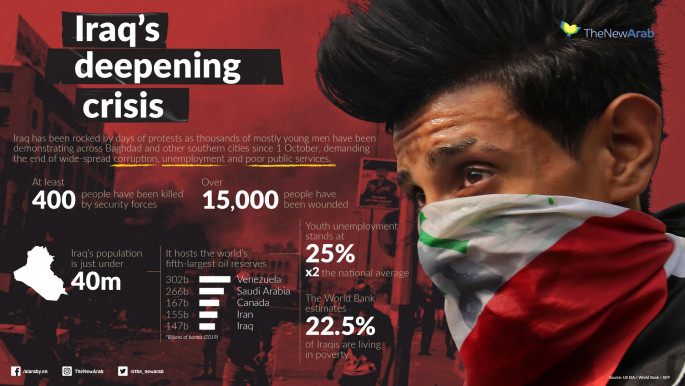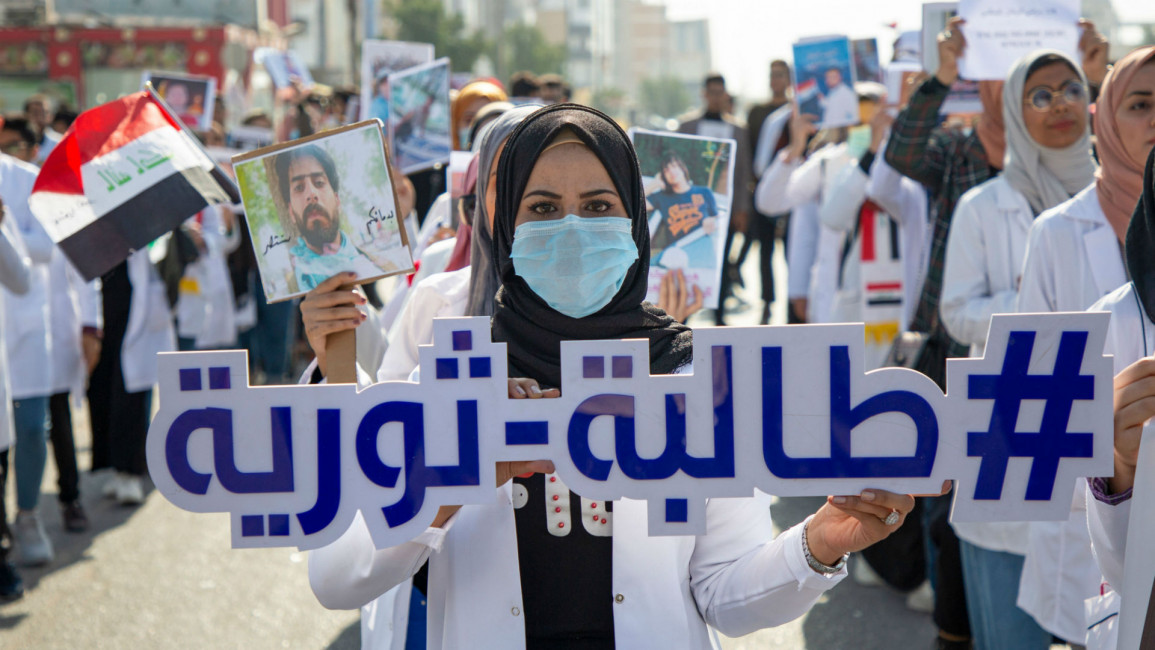Basra university students protest missile strikes, as Iran-Iraq proxy war hits Iraq
Hundreds of students at the historic Basra University, named after the city, gathered in front of the medical college where they chanted slogans about expelling America from the country.
Workshops about political systems and the impact of social media on the protests were some of the topics discussed.
Escalating aggression between the US and Iran over the killing of Iranian commander Qasem Soleimani, and Iran’s military response on two Iraqi airbases threatens to once more turn the country into a battleground again.
|
The death of Soleimani has brought people to the streets across Iraq, to join the monumental protests that have been taking place for months over economic and political reform.
A dangerous time
Iraq's president and speaker of parliament called Iran's missile attack on US inside of Iraq a "violation of Iraqi sovereignty".
President Barham Saleh on Wednesday said he feared "dangerous developments" in the region as a result of the strikes.
Saleh said they "denounced" the Iranian bombing and "renew our rejection of the repeated violation of state sovereignty and the transformation of Iraq into a battlefield for warring sides".
Earlier in the month Iraq's caretaker Prime Minister Adel Abdul Mahdi has criticised the US strike that killed Soleimani as an act of "aggression" that will "spark a devastating war".
Washington defended its actions in killing Soleimani and told the UN that it was acting in "self defence."
Trump on Wednesday announced further sanctions against Iran but said Tehran was "standing down" after the missile strikes.
Anti-regime protests
Iraq has been mired in protests for months with the death of activist Saadoun al-Luhaybi in Baghdad.
Read More: A decades-long battle: The Iran-US rivalry explained
He was shot in the head in a southwestern neighbourhood, a police source revealed, after he spent months participating in youth-led anti-government rallies in the capital since October.
Protesters are demanding to put an end to the governing class, which is seen as corrupt, inept and controlled by Iran in a civil rights movement that had spread from Tunisia and Algeria to the Middle East.
The protesters occupied Baghdad's renowned Tahrir Square, located across the river Tigris from the Green Zone, which houses government offices, the United Nations headquarters and foreign embassies.
Earlier this month an angry mob marched into the Green Zone and the US embassy to express their outrage over American air strikes that killed fighters from the Hashd al-Shaabi, or Popular Mobilisation Front (PMF), paramilitary network.
They besieged the embassy for over 24 hours and left the next day following orders from PMF.
 |
Demonstrators have been taken to the streets for three months, but they insist that they are not affiliated with the crowds that besieged and vandalised the US embassy.
"We've got nothing to do with that," one demonstrator in the Southern city of Diwaniyah (a rally hotspot) said.
Violence also hit the southern city of Nasiriyah overnight, with two activists surviving separate attempts on their lives.
Around a dozen activists have died in targeted killings across the country, among the nearly 460 lives lost in protest-related violence over the past three months.
Demonstrators have warned that these killings, along with kidnappings and different forms of harassment, are an attempt to scare them into halting their movement.
"What happened in front of the US embassy was an attempt to draw people's eyes away from the popular protests now in their fourth month," said Ahmed Mohammad Ali, a student protester in Nasiriyah.
"We're still here, protesting for change and hoping for victory," he told AFP.



